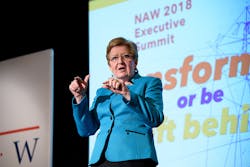NAW Meeting Pushes Distributors to Embrace Transformation
Attendees of the National Association of Wholesaler-Distributors at the Fairmont Hotel in Washington, DC, this week have been treated to keen insights on the changing terrain of distribution and how best to position their companies to respond. The meeting’s theme of “Transform or Be Left Behind” was reflected in presentations the opening morning.
Among the speakers at the meeting’s general sessions, Herb Meyer, founder of Storm King Press, shared a long list of worldwide trends that bode well for American businesses, including the falling rate of poverty, rise of the middle class and a growing embrace of modernity in Africa and the Middle East. He said particularly businesses in six sectors will thrive by serving those changing markets — energy, food, infrastructure, healthcare, education and entertainment.
Wholesale distribution specialist Jonathan Byrnes, a senior lecturer at MIT and founding partner of a software and consulting firm Profit Isle, Inc., presented a host of observations on how distributors need to align their strategy to adapt to changes of which “Amazon is just the tip of the iceberg.” He suggested an omni-channel approach that allows for different sales preferences of millennials versus baby boomers and moves customers toward relationships with more profit potential.
The roughly 300 NAW members in attendance got their annual shot of political insight from Jade West, Senior Vice President of Government Relations for the association. Along with observations on the infighting within both major political parties and the ongoing challenges inside the Trump White House, West pointed to a number of positive, business-friendly developments.
She called the administration’s roll-back of red tape and Obama-era regulations on business the biggest untold success story of the past year in Washington. She also pointed to an executive order expediting permitting on infrastructure projects and an executive order on apprenticeship programs to deal with the shortage of skilled workers in the country as well as several moves by the National Labor Relations Board and the Department of Labor to put an end to certain labor-friendly rules.
West said infrastructure investment is the biggest chance for bipartisan compromise in the months ahead. Aside from that, following the successful passage of tax reform late last year, Republican legislators have returned to the kind of sectarian infighting that sunk efforts to put an end to the Affordable Care Act. With important work ahead on immigration, budget issues, the debt limit, spending bills, the warring camps within the Republican party are again taking conflicting positions that will make it hard to get anything done.
West said most political pundits expect the Democratic party to regain control of the House of Representatives in the elections next November and that the Republican party’s best hope for maintaining control lies in making the tax reform bill popular by pointing to the bill’s impact on the health of the economy.
About the Author
Doug Chandler
Senior Staff Writer
Doug has been reporting and writing on the electrical industry for Electrical Wholesaling and Electrical Marketing since 1992 and still finds the industry’s evolution and the characters who inhabit its companies endlessly fascinating. That was true even before e-commerce, LED lighting and distributed generation began to disrupt so many of the electrical industry’s traditional practices.
Doug earned a BA in English Literature from the University of Kansas after spending a few years in KU’s William Allen White School of Journalism, then deciding he absolutely did not want to be a journalist. In the company of his wife, two kids, two dogs and two cats, he spends a lot of time in the garden and the kitchen – growing food, cooking, brewing beer – and helping to run the family coffee shop.
